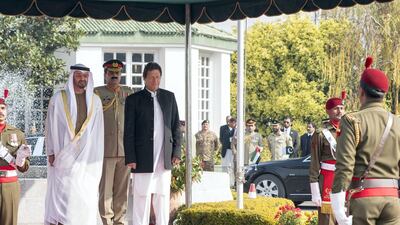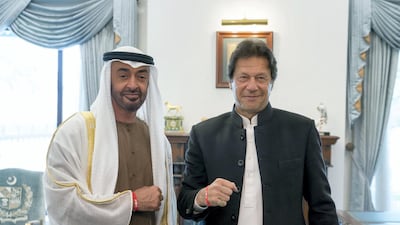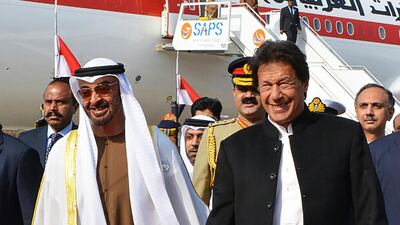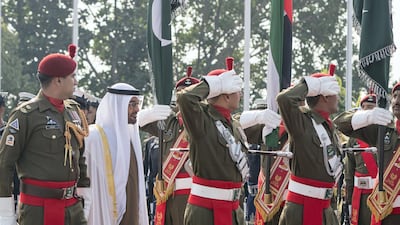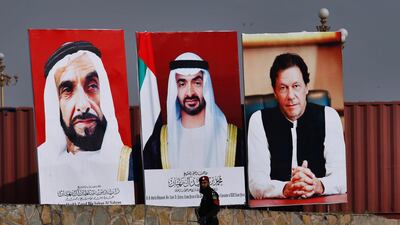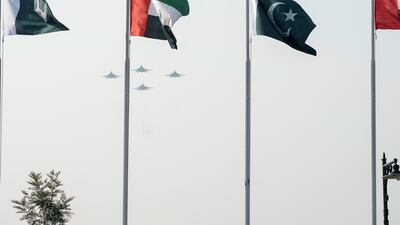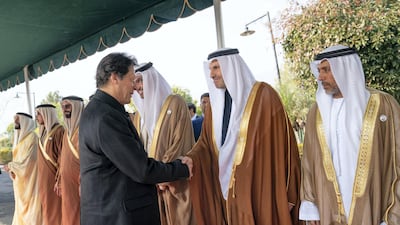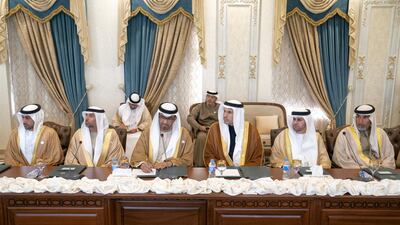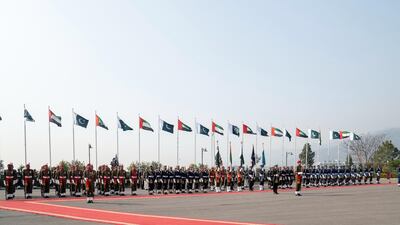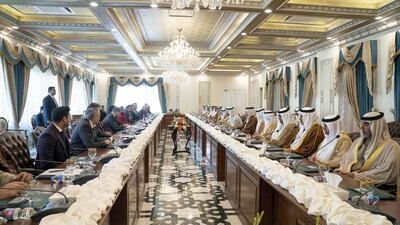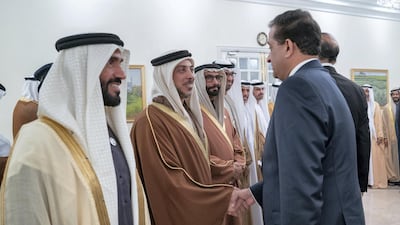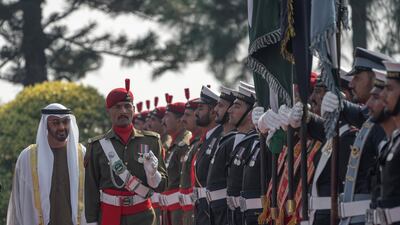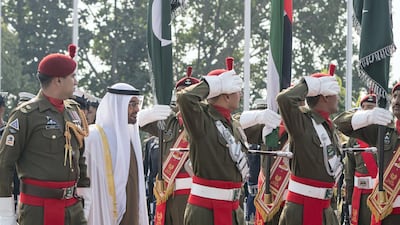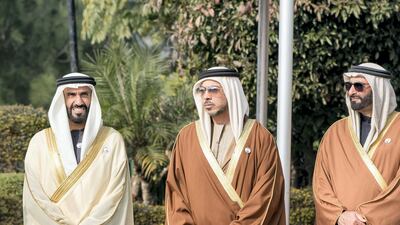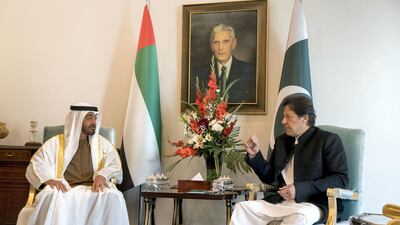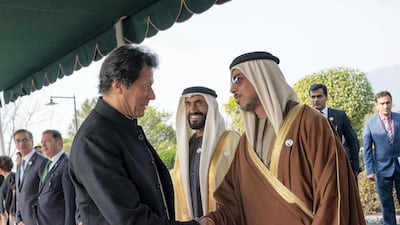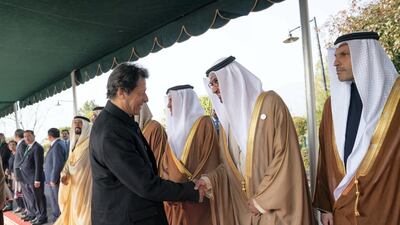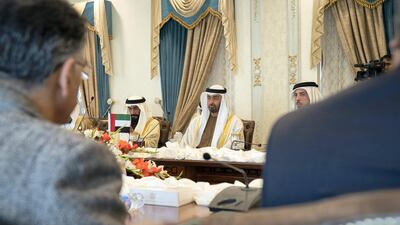Abu Dhabi's Crown Prince visited Islamabad on Sunday for one-to-one talks with Pakistan Prime Minister Imran Khan, who is seeking Emirati help to avert a financial crisis.
Sheikh Mohamed bin Zayed was making his first visit to Pakistan in 12 years as the UAE weighs billions of dollars in aid and investment for the country.
Sheikh Mohamed, who is also Deputy Supreme Commander of the Armed Forces, left on Sunday night.
Expressing keenness to develop co-operation with Pakistan to serve the two countries' common interests, Sheikh Mohamed spoke of his deep appreciation for the country, the UAE's Wam news agency reported.
"My close relationship with Pakistan started at a very young age, during my childhood. And I'm lucky today to be in Pakistan in my first official foreign visit during 2019. My sincere wishes for success and prosperity to the government and people of Pakistan," Sheikh Mohamed said.
"We spare no effort to promote the values of tolerance, dialogue, coexistence and co-operation in the face of various regional and international challenges."
Mr Khan thanked the UAE for the generous balance of payment support of US$3 billion (Dh11bn) it has already announced, according to joint statement released after the leaders' meeting.
Pakistani officials have said $3.2bn more in deferred oil payments was under discussion, and plans for the UAE to help build an oil refinery had also reached their “final stage”, Pakistan's information minister said on Sunday night.
Mr Khan said the UAE's financial support showed its continued commitment and steadfast friendship to Pakistan over the years. He also welcomed UAE interest in investing in Pakistan’s oil and gas, logistics, ports and construction sectors, the joint statement said.
Sheikh Mohamed and Mr Khan have met three times in as many months as Islamabad seeks help to stave off a balance of payments crisis.
Pakistan's Ministry of Foreign Affairs said Sunday's visit was “testimony to the special nature of our brotherly relations”.
The importance of the relationship to Islamabad was underlined by the warm welcome given to Abu Dhabi's Crown Prince.
Sheikh Mohamed was greeted with a guard of honour and 21-gun salute when he touched down at Nur Khan air base in Islamabad, before Mr Khan took the wheel to personally drive him to a reception at Prime Minister House. The capital's streets were hung with portraits of the Crown Prince.
“It's a very important relationship in the sense that Pakistan wants to expand its relations with Muslim countries and is desperate to get financial assistance,” said Talat Masood, a political analyst and retired army general. In turn, the UAE was keen to ensure Pakistan did not cosy up to Iran, he said.
_______________
Read more:
UAE to deposit $3 billion in State Bank of Pakistan
Pakistan seeks UAE assistance as delegation arrives
Saudi Arabia pledges $3 billion to Pakistan amid balance of payment crisis
_______________
Mr Khan inherited a looming economic crisis when he took office five months ago, with the Pakistan's foreign reserves nearly gone and a growing balance of payments deficit.
South Asia's second-largest economy is trying to fill a gap estimated at about $12bn.
While the former cricketer's government is in negotiations with the International Monetary Fund, Mr Khan has repeatedly said he is reluctant to rely on the Washington-based body.
A new IMF bailout would be Pakistan's 13th since the late 1980s and is expected to come with demands for painful reforms and transparency over sensitive Chinese loans to Islamabad.
Instead Mr Khan has shuttled between China, Saudi Arabia and the UAE to seek help from his country's closest allies.
Pakistan announced in October that Saudi Arabia had pledged a $3bn cash injection and a further $3bn in deferred oil payments. The last of three Saudi cash payments is expected this month.
China, which is investing billions in Pakistan through its Belt and Road initiative to drive trade through Asia, has also helped out but has refused to reveal by how much.
Mr Masood predicted Islamabad would still need to approach the IMF, but the billions gained from Saudi Arabia, China and the UAE would give it a stronger negotiating hand.
“The money [from allies] has been reasonably generous, but I think we would still be going to the IMF,” he said. “We need far greater discipline in our financial system and we can only get that from the IMF.”
Pakistani media also suggested that the UAE was poised to build an oil storage depot at the new Chinese-built port of Gwadar, as well as a deep-conversion oil refinery joint venture.
The UAE also supports Pakistan with aid for education, health, energy and infrastructure development and has given large sums to fund the country's polio eradication programme.
Mr Khan's months in office since his July election win have been dominated by attempts to deal with the country's financial woes, but his critics complain of indecision in finding a plan to turn the economy around.
The rupee has been devalued twice since he took power, and while his ruling Pakistan Tehreek-e-Insaf appears to remain the most popular party, disenchantment and rising costs may soon begin to eat into his popularity.
Mr Khan has also been accused of a series of U-turns in dealing with the country's powerful hardline religious bloc, which successfully demanded the removal of one of his economic advisers because he was a member of the Ahmadi religious minority. The prime minister also backtracked on the acquittal of a Christian woman who spent eight years on death row for blasphemy. Hardliners paralysed the country with protests for three days until Mr Khan agreed to allow a petition to review her supreme court acquittal.
The ringleaders of the protests were eventually arrested, but Ms Bibi remains in protective custody pending the result of the petition.
